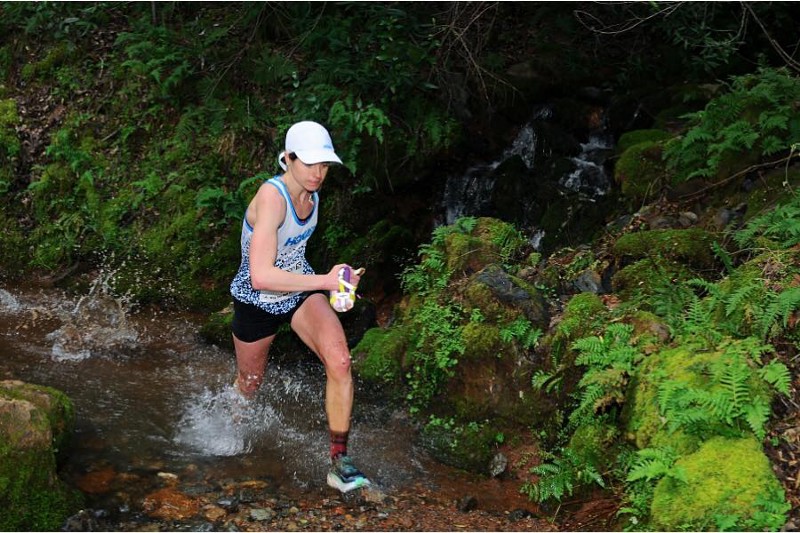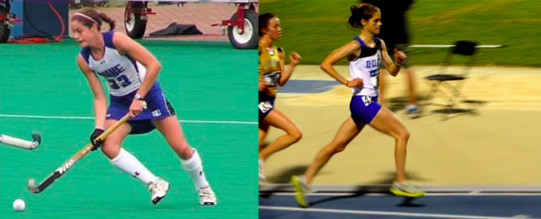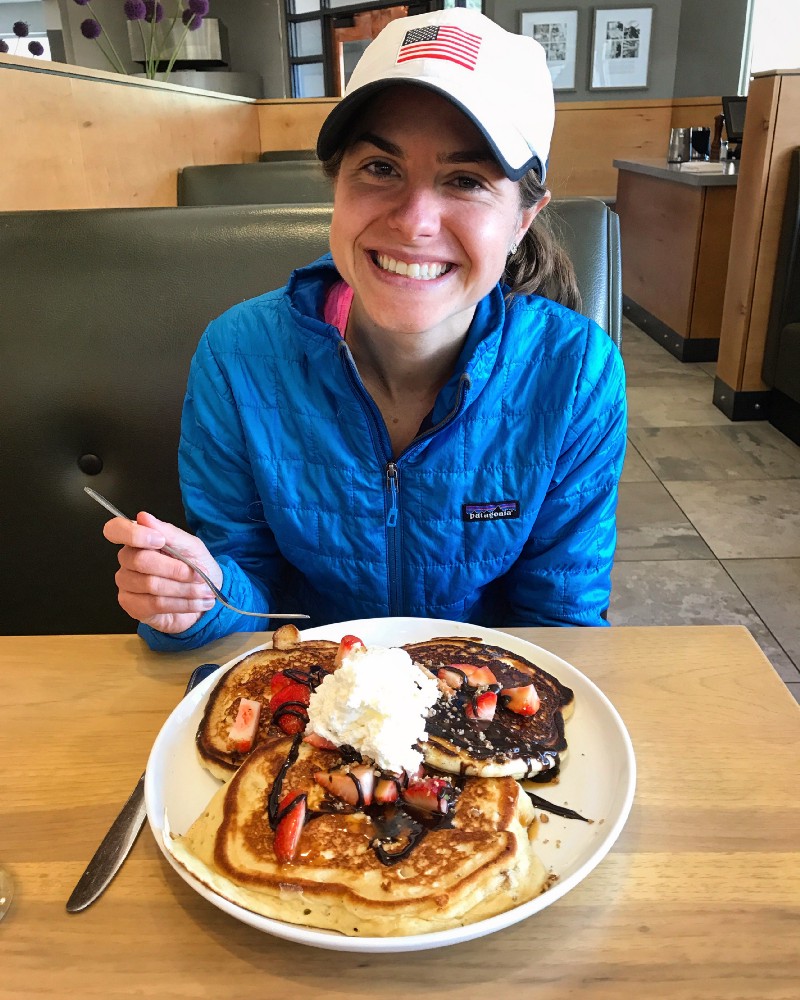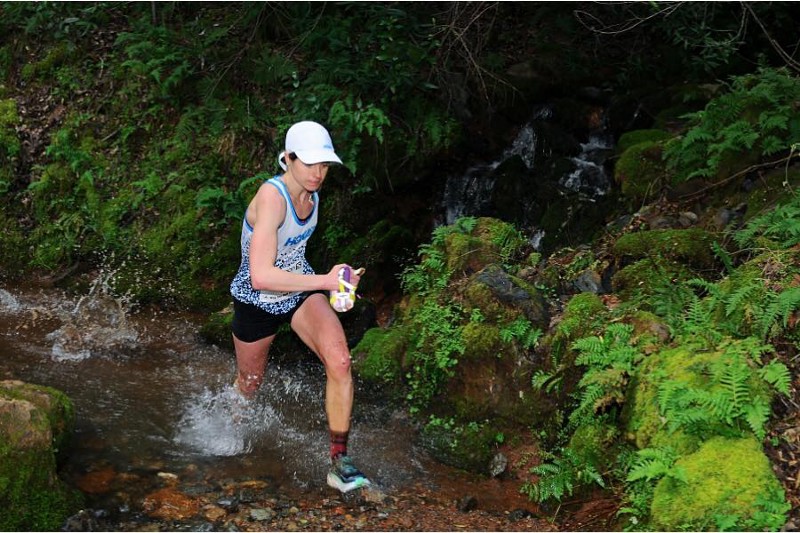I was first introduced to Megan Roche while searching for female role models in the trail running community. I’ve turned to Megan’s wisdom, experience, and humor for support and guidance throughout my own recovery and find that her voice (or at least, the voice I heard in podcasts and online videos) is often the one reminding me to take care of myself. Megan and her husband and coaching partner David Roche are advocates for healthy body image and have shared their thoughts on disordered eating and body image stigmas in Trail Runner Magazine.
Recently, I had the privilege of meeting Megan in person — over avocado toast, of course. Her passion for adventure is contagious and her support, interest, and kindness, even after just meeting, was incredible. Megan is kind, hilarious, and knowledgeable. She knows her stuff — as evidenced by both her personal running career and the fact that she is a medical student at Stanford. Megan has won countless ultras, represented the United States in the World Mountain Running Championships six times, and is a four-time national champion and the North American Mountain Running Champion. She also owns a puppy named Addie and coaches athletes of all levels with her husband, David Roche, through their team SWAP (Some Work All Play).
Megan answered the 9 questions below for us and provided the photos. We’re thrilled to welcome her to the Lane 9 Community!
Are you an elite runner, influencer, or active woman? Join us, share your story, or just say hi through our L9P form.
9 Miles with Elite Trail Runner Megan Roche

Photo provided by Megan Roche
Why is running (and trail running in particular) your sport of choice?
For some unknown reason, I loved running immediately. As a 4 year old, I used to run around the house over and over again, just for fun. Then, when playing youth ball sports, I would actually look forward to wind sprints and timed runs. I was a crazy child, and I think I just needed that daily energy release to feel closer to a normal human being.
In college, I realized that I could use that love of running to cover ground and get to beautiful and remote places if I hopped on trails. So I started running out my dorm door and heading to the Duke Forest each day. After graduating, I spent a summer in Colorado, and it dawned on me that I could cover 20 miles of remote, high-alpine trails through trail running. I’ve since traveled the world to trail race and I am still amazed each day by the beauty I get to see in the world, and at home, just by covering ground.
What is the biggest lesson running taught you?
One of my favorite quotes is by Kurt Vonnegut — “We are here to help each other get through this thing, whatever it is.”
I’ve come to realize that in the grand scheme of life, running is meaningless. At the end of the day, does it matter how fast we run up and down a mountain? Does it matter who wins a random race in the Rockies or some road marathon in Texas?
What matters is how running enables us to engage with the community and connect with others. And how we can use running as a tool to becoming better people — and especially better parents, partners, and friends.
What is your favorite mile on a long run? Your least?
The first few steps out the door are my least favorite mile. They usually only add up to 0.05 miles, but they often feel like a mile, so I will go with that! My favorite miles are the rest. I don’t play favorites, because with trail running you never know when you are going to see something extraordinary on a random mile 3 of a 15-mile run.
Have you ever experienced disordered eating or had an eating disorder?
I went to college to play field hockey, but in the back of my head, I always considered taking a fifth year to run track and cross-country. The cross-country team would run a loop around our field hockey turf on Wednesdays, which often coincided with our strength circuit. I distinctly remember one field hockey practice, where it dawned on me that I was a totally different build than some of the cross-country team and than most collegiate runners.
At the time, I considered long distance running a physics equation with speed equating to a power to weight ratio (though I probably should have considered the fact that physics was my worst grade in college). So I spent my senior year of college purposefully cutting weight for running in preparation for track. I lost weight and got faster and then joined the track team and ran some decent times for a field hockey player with no racing experience.
That equation lasted about six months before it failed me. All of the sudden I was exhausted all of the time, my running times tanked, and I hated the idea of even running a few miles. It wasn’t until I went to the Stanford Invite and saw professional runners racing that I realized I had totally messed up my equation — most of those runners were strong and healthy.
In that moment, I realized that runners at a healthy weight had the highest probability of surviving long-term training to have successful careers into their 20s, 30s, and 40s. That night I ordered a pepperoni pizza and haven’t looked back.

Photo provided by Megan Roche
My brief journey into what was disordered eating in retrospect was centered on an equation and a misconception rather than body image or self-esteem. I’m lucky because by the time I entered competitive running I had a boyfriend (spoiler alert, now husband), an exciting life adventure (med school), and a thirst for mountain adventures (running 14ers). I think that if I had found running earlier in life without those tools, I may have had issues with body image or self-esteem, which would have made it more difficult to so rapidly switch directions.
Has running changed the way you eat? If so, how? If not, why not?
Ever since I had the realization that long distance running is far from a power to weight ratio, I have approached eating with quasi runner-med student priorities — what can I find to eat that is delicious, abundant, cheap, and quick?
From a nutrition standpoint, I try to always eat within 30 minutes of a run, do at least two nights a week with red meat to prioritize iron absorption, and focus on consuming adequate protein. I avoid all sugar-free, fat-free, and zero-calorie options (definitely counts as too expensive if you aren’t actually getting any calories). I have no food restrictions and try to eat based on what I find most delicious and nutritious — often that winds up being chocolate chip pancakes, smoothies, burgers, sweet potato fries, pizza, pasta, and avocado toast (yup, I don’t own a home).

Photo provided by Megan Roche
What’s the most important thing you want women to know about the sport of running — trail and ultrarunning in particular?
Trail running is an amazing sport because of the community of inspiring runners and support from others. Finish lines are rewarding, but trail running is more about the process that you take to get to the finish line and the memories that you make covering beautiful trails along the way. It’s hard to take yourself too seriously while trail running and difficult to judge yourself along the way.
How did you get started coaching?
Prior to starting SWAP (Some Work All Play — the coaching group started by David and I), David and I coached each other. We fired each other multiple times, but fortunately marriage is a more stable coaching contract. Basically, we learned through trial and error on each other.
When I was in my first year of med school, David started feeling bad about always watching TV shows while I was studying late at night, so he started coaching as a hobby and way to appear busy. It turns out (no surprise to me), that David was a really skilled coach. He started coaching more and more professionals as well as beginner runners and now has transitioned from his previous job as a lawyer to coaching full time.
In a similar manner, I found myself with just enough free time this year as a fourth year med student to start coaching. I started taking on athletes for fun, and then fell in love with coaching. Coaching is about so much more than running. It’s about being there for athletes through breakups, job promotions, injuries, and all of the other ups and downs of life. It’s rewarding and makes me realize that you don’t need a more traditional profession to impart change on a community.
What tools do you provide your athletes when body image concerns and/or disordered behaviors emerge? How do you help them combat this tendency? How do you personally combat it?
In my opinion, one of the biggest ways to help is through unconditional support and understanding. Because I try to know my athletes on a personal level, I find that when I discuss these issues, they understand that I am coming from a place of friendship and support. I am open with all of my athletes and we wind up discussing all kinds of things — the menstrual cycle, relationships, mental struggles, health issues — and this makes it easier to transition to potential body image or disordered eating concerns. I also use humor when the time is right. Sometimes we all just need a good I CAN HAZ CHEEZBURGER meme.
Typically, I start the conversation by grounding disordered eating and body image concerns in performance. I emphasize that even just a day of underfueling a week can put an athlete at risk for bone stress injuries or poor recovery from workouts. For some athletes that is all it takes to help improve things. Other times, I just address the body image concerns up front. Finally, I almost always encourage athletes to talk to a nutritionist or other health professional.
For myself, I think that my desire for a long running career, my passion for coaching, and my enormous love of pizza has kept disordered eating thoughts at bay.
Where can readers find you and support you and the SWAP team in your adventures?
SWAP: Someworkallplay.blogspot.com
Strava: https://www.strava.com/pros/3445498
Instagram: @MegRoche3
Twitter: @MegRoche33
Email: MeganDDeakins@gmail.com
